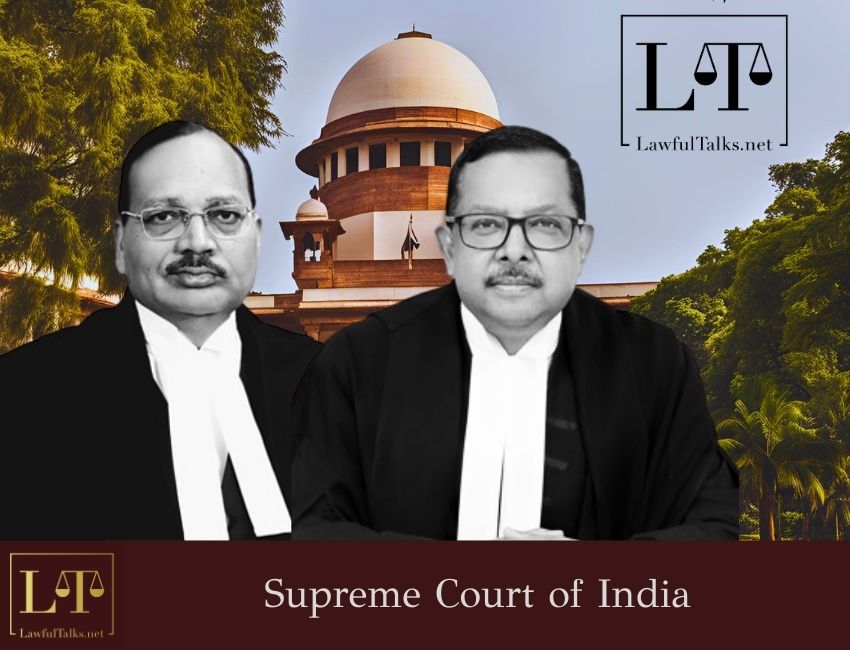Allahabad HC Sets Aside Afzal Ansari's Conviction, Allows Him to Continue as MP

Supreme Court Reinstates Ousted Woman Sarpanch, Criticizes Villagers and Authorities for Gender Bias

This is "a classic case where the residents of the village could not reconcile with the fact that a woman was elected to the office of sarpanch."
"Removal of an elected representative should not be treated lightly, especially when it concerns women belonging to rural areas," stated the division bench of Justice Surya Kant and Justice Ujjal Bhuyan of the Supreme Court, voicing their strong disapproval after hearing a plea from an elected woman sarpanch from a rural area of Maharashtra who was removed by villagers and government authorities on frivolous grounds.
It was the plea of Manisha Ravindra Panpatil, an elected sarpanch of the Gram Panchayat of Vichkheda in the Jalgaon District of Maharashtra, that she was ordered to be removed from the post of sarpanch after a complaint by fellow villagers that she was allegedly residing with her mother-in-law in a house constructed on government land. Denying the allegation, Panpatil averred that she does not reside in that dwelling, but rather lives with her husband and children in rented accommodation. Subsequently, the District Collector passed an order disqualifying her from continuing as sarpanch without ascertaining the facts and based on ‘bald statements.’
Detailing the next stage of her ouster, the court stated, "This order was thereafter confirmed by the Divisional Commissioner. Subsequently, the High Court, vide the impugned order, dismissed the appellant’s writ petition against the commissioner’s order on a technical ground, thus putting a seal of approval on her removal from office."
Observing that the villagers were picking at frivolous straws in a bid to evict Panpatil from her position, the bench added that they were being aided by mechanical and summary orders passed by government authorities at various levels. "These orders were passed in a lackadaisical manner, without making any effort towards conducting a fact-finding exercise, so as to confirm whether the allegations levied by the private respondents were sufficiently made out. There is nothing on record to suggest that any objection of the appellant’s family having encroached upon government land was ever raised when she filed her nomination papers," the bench stated.
Setting aside her unceremonious ouster, the court came down heavily on the villagers and government officials involved in the case, observing that they acted because they were unable to come to terms with the reality that a female sarpanch would make decisions on their behalf, which they would be bound to follow.
"This scenario gets further exacerbated when we as a country are attempting realize the progressive goal of gender parity and women empowerment across all spheres, including public offices and most importantly adequate women representative in the elected bodies, such instances at the grass-root level cast a heavy shadow on any headway that we may have achieved.," remarked the bench.
Asserting that it is imperative to acknowledge the significant struggles faced by women who succeed in occupying public offices, the court observed, "All that we would like to reiterate is that the matter of removal of an elected public representative should not be treated so lightly, especially when it concerns women belonging to rural areas."
Noting that this case is far from unique and, unfortunately, somewhat of a norm, the bench asserted that the private respondents (villagers) may have operated in a discriminatory manner. Expressing serious concern and disapproval over the casual approach of government authorities in summarily removing an elected representative, the court observed, "This is all the more concerning when the representative in question is a woman and elected in the reservation quota, thereby indicating a systemic pattern of prejudicial treatment, permeating through all levels of administrative functioning.."
Bearing in mind the facts and circumstances of the case, the court held that it found no credible or convincing material to substantiate the allegations of encroachment on government land by Panpatil, either before or after her election as sarpanch. Disapproving of her removal and calling it "highly disproportionate," the court remarked, "In this vein, the concerned authorities need to sensitize themselves and work towards creating a more congenial atmosphere where women, such as the appellant, can prove their worth by rendering their services as Sarpanch of the Gram Panchayat."
Setting aside the Bombay High Court order of August 3rd, 2023, the Apex Court allowed Panpatil to continue as sarpanch of the Gram Panchayat and perform her duties until the completion of her tenure.
Advocates For Petitioner(s): Mr. Sudhanshu S. Choudhari, Sr. Adv. Mr. Vatsalya Vigya, AOR, Ms. Gautami Yadav, Adv., Ms. Pranjal Chapalgaonkar, Adv. Ms. Sapna Sinha, Adv. Mr. Akshay Sinha, Adv.
Advocates For Respondent(s): Mr. Prashant Shrikant Kenjale, AOR, Mr. Shrirang B. Varma, Adv., Mr. Siddharth Dharmadhikari, Adv., Mr. Aaditya Aniruddha Pande, AOR
Case Details: Manisha Ravindra Panpatil v. The State of Maharastra & Ors., Civil Appeal/10913/2024
(For more updates, tap to join us on Whatsapp, Facebook, Instagram and LinkedIn)

Shalini Chavan
Advocate, Bombay High Court
Latest Posts
Categories
- International News 19 Posts
- Supreme Court 347 Posts
- High Courts 361 Posts


















































































































































































































































































































































































































































































































































































































































































































































